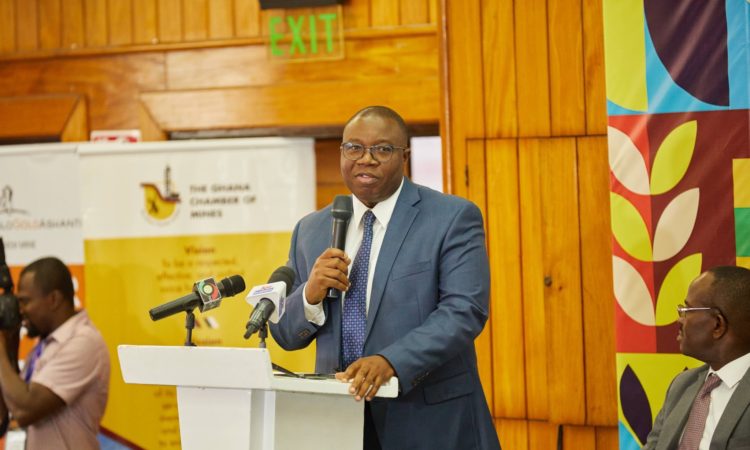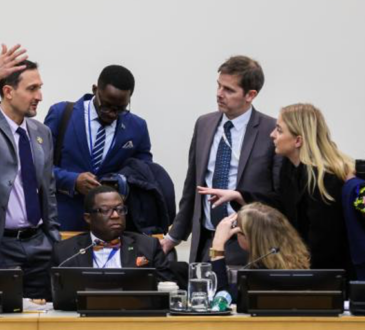
By Eugene Davis
The Ghana Chamber of Mines is asking government to develop policies and programmes which seek to improve businesses’ performance rather than “squeezing everything” out of them through taxes and levies.
According to the President of the Ghana Chamber of Mines, Mr. Joshua Mortoti, the mining sector is being hit with so much taxes to the point that it could shut down some operations and also put new investments on hold, if the tax regime is not reconsidered.
Presenting his report at the 95TH Annual General Meeting of the Chamber in Accra on Friday, he stated the industry is willing to share alternative ideas that will benefit both parties because the growth of the economy will impact positively on all businesses.
“Despite being the backbone of our economic recovery programmes, I can say that the mining industry has been the most taxed industry in recent times. Notwithstanding these pressures, our industry provides great opportunities for sustainable national development. We believe that one of the surest ways of achieving this is through industrial linkages. We, therefore, urge the Ministries of Trade and Industry and Lands and Natural Resources to synchronize policies to help achieve this objective of local input manufacturing.”
Mr. Mortoti, indicated that imposition of taxes including the Growth and Sustainability Levy (GSL) Levy endangers the continuous operations of some mines and risks curtailing the expected cash flows associated with the impost.
“Such an outcome would not only hurt the state’s revenue objectives but also threaten the security of employment, businesses of mining support service firms, as well as mining firms’ continued investment in their host communities.”
Others such as Ex-Refinery Price, Energy Debt Recovery Levy, Price Stabilisation and Recovery Levy, Income Tax, Ring Fencing, Exclusion of Consumables from the Mining List.
They also called for the adoption of a sliding scale royalty regime based on the price of minerals which they reckon enhances predictability in the fiscal regime and accommodates the volatile mood swings of the minerals market, especially the price of gold, the mineral most mined in Ghana.
The Chamber also proposed to government to retain the existing practice where mining companies have binding retention agreements based on their forex requirements. Apart from disrupting the commercial arrangements between the mines and their suppliers, a variation in the mineral revenue retention regime will also saddle them with additional transaction costs and potential delays.
They also urged government to expedite action on the Western Railway Line since it has the inherent potential to generate revenue to pay back the initial investment cost.
CEO of the Chamber, Dr. Sulemanu Koney reiterated his call on the need to step up security in the mining areas, which he says was deteriorating.
He noted that as the chamber continue to pursue its goal of positioning Ghana as the mining support services hub in West Africa as well as promote sustainable and responsible mining in the country, “the quest is threatened by the worsening security situation in the mining industry. Our members are under attack on two fronts: fiscal as well as physical.”
On the fiscal front, he explained that the lack of predictability and the constant tweaking of the fiscal regime, even for companies with Development and Investment Agreements which freeze their fiscal terms, is a worry for investors. These same investors have their in-country assets under siege by illegal miners who invade concessions and destroy properties with impunity and mostly without consequences.
Lands Minister, Samuel Abu Jinapor in a speech read on his behalf maintained that they are working “hand in hand” with the chamber regarding the fiscal and physical fronts to bring some stability to the industry.
He also added that the ministry has been working on developing and implementing effective collaborative approaches to combating illegal mining together with its related negative impacts. “These are aimed at promoting transformation, growth and development whiles ensuring that all stakeholders derive sustainable benefits from the country’s mineral wealth.”
Gold Production inches up
Meanwhile, the country’s gold output increased from 2.8 million ounces in 2021 to 3.7 million ounces in 2022 due to concurrent growth in the output of both large and small-scale sectors, the chamber announced at the AGM. This translates into a 32 percent increase in production in the gold sub-sector. The large-scale gold sub-sector recorded its highest output in the country’s history in 2022.
This according to the address by Mr. Mortoti was necessitated by a combination of fresh output and expansion of production at existing large-scale mines drove the large-scale sector’s contribution to national gold output from 2.7 million ounces in 2021 to 3.1 million ounces in 2022, representing an increment of 13 percent.
The planned gold production of the Chamber’s producing members would approach 3.2 million ounces at the end of 2023. This projected growth in production would be driven by a broad-based increase in output. Overall, the country’s gold output is projected to range between 3.3 to 3.5 million ounces in 2023.







